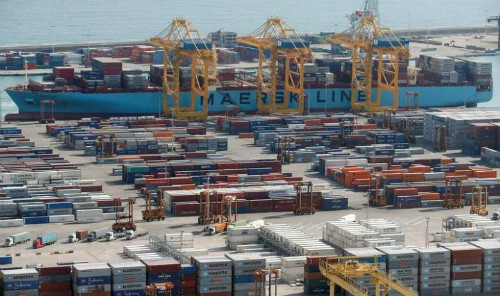Catalonia's '2 gains' and '3 losses' if it 'secedes' from Spain
Catalonia's gains and losses if it separates from SpainIf it becomes independent, Catalonia could benefit economically in the short term but would face numerous difficulties in building a young state.
 |
A woman holds a Catalan separatist flag on the streets of Barcelona on October 2. Photo: Reuters. |
Catalonia, one of Spain's autonomous regions located in the northeast of the country, will unilaterally declare independence from Spain in the coming days, after a controversial referendum on October 1 showed that more than 90% of Catalan voters supported separation from Spain.
The Catalan people's desire for independence stems from their desire for self-determination in all areas, including culture, politics, and economics. The obvious immediate benefit of independence is economic autonomy, but Catalonia will face many challenges when it comes to building a new state.
Tax revenue will increase
"Madrid nos roba" (Madrida robbed us) is a popular slogan used by the separatist movement in Catalonia. Catalans believe their autonomous region contributes more to the Spanish state budget than it receives in return.
According to the BBC, Catalonia is certainly richer than other regions of Spain. Making up only 16% of Spain's population, Catalonia contributes 19% of Spain's GDP and more than 25% of Spain's total exports.
Catalonia’s influence on the Spanish economy is most evident in tourism. Last year, 18 million of the 75 million international tourists who visited Spain chose Catalonia as their main destination. The Catalan port city of Tarragona is also one of Europe’s largest chemical hubs.
Barcelona, the capital of Catalonia, is one of the top 20 EU ports in terms of cargo volume handled. One-third of Catalonia's workforce has a university degree.
In fact, it is true that Catalans contribute more in taxes than Madrid allocates to them each year. In 2014, Catalans paid €10 billion more in taxes than their region spent on public spending.
Could Catalonia close this gap after independence? Some argue that while Catalonia would collect more taxes under independence, the costs of creating and running new public institutions would eat up the surplus. Others argue that it would be reasonable for the Spanish state to redistribute resources from richer to poorer regions.
Much to do
According to the BBC, at first glance, Catalonia appears to have everything it needs to form an independent state, including a flag, a parliament, and a leader. The autonomous region also has its own police force, the Mossos d'Esquadra. Catalonia has its own broadcasting authority and even diplomatic missions, or "mini-embassies," to promote trade and investment in Catalonia from around the world. Catalonia also provides some public services, such as education and health care.
But if Catalonia were to declare independence, it would have a lot of work to do, such as controlling borders and transport; building customs and defense forces; establishing international relations, a central bank and a tax service, all of which would be run by Madrid. But assuming these new institutions are created, will Catalonia have enough money to cover their operations?
According to AP commentator Ciaran Giles, after declaring independence, apart from taking down the Spanish flag from government buildings, Catalan authorities can hardly do anything else. The declaration of independence is only symbolic. Ciaran Giles believes that Catalonia does not have enough security forces to set up borders, while important areas such as tax, diplomacy, defense, airports, seaports, and trains are all under the control of the Spanish government in Madrid. Recently, Spain has also taken almost complete control of Catalonia's spending activities.
 |
Barcelona Port, one of the 20 largest ports in the EU. Photo: Reuters. |
Public debt threat
Perhaps a bigger concern is Catalonia’s public debt. The Catalan government owes €77 billion, or 35.4% of the autonomous region’s GDP. Of this debt, €52 billion is owed to the Spanish government.
In 2012, the Spanish government set up a special fund to provide financing to regions unable to borrow money on international markets after the financial crisis. Catalonia has been the biggest beneficiary, receiving around €67 billion since the fund was disbursed.
After declaring independence, Catalonia will no longer have access to this fund. The question is how much debt a future independent state of Catalonia would be willing to pay to Spain?
That issue will overshadow any negotiations between the two sides. Another issue is whether Catalonia would be forced to share Spain's national debt if it seceded.
Not recognized
No country or international body has expressed support for the Catalan government’s independence movement, so any declaration of independence by Catalonia would likely be rejected from the start. The European Union (EU) has stood by the government of Spanish Prime Minister Mariano Rajoy in stating that Catalonia would be expelled from the EU and barred from using the common currency, the Euro, if it declared independence.
Economically, it is difficult to predict whether Catalonia will survive a breakaway from Spain. Catalonia’s annual GDP is around €215 billion, the highest of any Spanish region and larger than that of Greece. But many of the region’s goods are supplied by the Spanish state.
Two-thirds of Catalonia's exports go to the EU. Catalonia would need to apply for EU membership if it split from Spain, and that would require the consent of all member states, including Spain.
Some in the pro-independence camp have suggested that Catalonia could settle for a Norway-EU model, where Catalonia would not be a member of the EU but would continue to have close ties with the EU as a member of the European Economic Area (EEA). However, the EU may not support Catalonia, and Spain would also try to block Catalonia’s efforts to establish economic ties with the EU.
Facing Madrid's punishment
Ciaran Giles argues that in the event of Catalonia declaring independence, Spain has two main options. Article 155 of the Spanish Constitution allows the government to completely or partially suspend the autonomy of any region if its government fails to comply with its constitutional commitments or attacks the common interests of Spain.
First, Catalonia will be warned and if the regional government continues to fail to comply, further measures will be put to a vote in the Spanish Senate, which will be a simple matter for Prime Minister Rajoy, whose party holds a majority in the Senate.
Further measures could include placing all Catalan police under Spanish control. If necessary, Spanish police forces could be deployed to enforce these measures.
A more drastic option would be to declare a state of siege if Spain’s sovereignty were threatened by Catalonia’s independence. This would allow civil liberties to be suspended and martial law to be imposed in Catalonia. This measure would need to be debated and approved by Spain’s lower house of parliament, a difficult step because Mr Rajoy’s party holds only a minority in the lower house.
Neither option is likely to be implemented immediately. Fernando Simon, a professor of constitutional law at the University of Navarra in Spain, said that both options would leave Spain in an uncertain future.
Given the current situation, a compromise is the best option for all parties. But if neither the Spanish government nor Catalonia is willing to make concessions, this is unlikely to happen.
Both sides say they are ready to talk but have set unacceptable conditions for each other. Prime Minister Rajoy has insisted that a referendum will not be discussed unless the constitution is changed and has invited the Catalan government to work on it. The Catalan government says Catalonia's right to self-determination must be respected before talks can begin. Catalonia wants EU intervention but this is unlikely. Catalonia has also called for international mediation but Spain will not agree to this.
"The situation in Spain is really serious," said Mr. Simon.
According to VNE
| RELATED NEWS |
|---|








